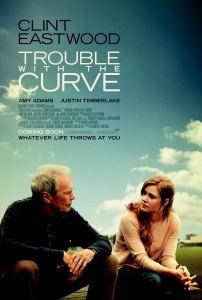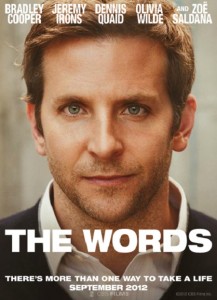 Clint Eastwood plays a broken-down, professional baseball scout in the last three months of his contract. His physical ailments are making it increasingly difficult for him to do his job the way he’s always done it—watching and evaluating high school ball players across the country for hours and days at a time. Amy Adams plays the scout’s grown child who’s struggling to maintain a relationship with her emotionally distant father.
Clint Eastwood plays a broken-down, professional baseball scout in the last three months of his contract. His physical ailments are making it increasingly difficult for him to do his job the way he’s always done it—watching and evaluating high school ball players across the country for hours and days at a time. Amy Adams plays the scout’s grown child who’s struggling to maintain a relationship with her emotionally distant father.
Eastwood’s rough exterior and Adam’s romantic interests keep the story from lapsing into a psychological study of why and how this father/daughter relationship came to be so estranged. On the surface, there are plenty of obvious reasons—widower raising young girl alone, workaholic daughter trying to please her distant father, and years of not communicating and making assumptions.
The PG-13 rating comes from all the crude, high school guy-talk and the profane jargon we’re used to in an Eastwood character. With the professional baseball setting, I’m not sure the language is all gratuitous, but it seems so coming from Ms Adams despite her excuse that she learned it from her father.
Screen writers love to use baseball as a metaphor for life, and so it is with this movie, certainly the title. When life throws us a curve ball (something that turns out to be quite different from what we first expected), how we respond will determine our opportunities for the future. Trouble with the Curve is a simple story, well-acted, and true enough to be believable if not a little two-dimensional.
 The format of the movie, The Words, makes it intriguing, if not confusing at times. This is a story within a story, within a third story. It is also the title of a best-selling book written by an author, in obvious mid-life crisis, played by Dennis Quaid. Quaid examines his own ethical decisions through the life of his main character played by Bradley Cooper.
The format of the movie, The Words, makes it intriguing, if not confusing at times. This is a story within a story, within a third story. It is also the title of a best-selling book written by an author, in obvious mid-life crisis, played by Dennis Quaid. Quaid examines his own ethical decisions through the life of his main character played by Bradley Cooper.
Cooper’s character, a struggling author, finds a manuscript apparently written by another unknown author of yet another decade. Keeping all the authors and their “words” straight proves to be a little daunting, but definitely engaging. Each of the authors “must choose between life and fiction,” as do all of us. The happy endings, good intentions, and excusable wrong choices we make become the fiction we write into our own stories.
It’s all too easy to choose the fantasy we’ve created over the real-life people who’ve been put into our lives —“loving ‘the words’ more than the one who inspired them” as Quaid comments. What Cooper’s character does when his choice is discovered is the question that underlies the movie, The Words. (Rated PG-13 for its own words.)
I loved this movie with its interwoven, complicated plots and the believable characters who made me feel a part of the story. I wondered what I would have done. Would I have chosen fiction or real life? Unlike the third author played by Jerome Irons who laments, “Everyone makes choices in their lives and there’s no one to help you live with the consequences,” I know Someone who will help me live with the consequences of my bad choices, if I’ll let Him.
Date
Insert picture of movie poster.
Review the movie.
 Clint Eastwood plays a broken-down, professional baseball scout in the last three months of his contract. His physical ailments are making it increasingly difficult for him to do his job the way he’s always done it—watching and evaluating high school ball players across the country for hours and days at a time. Amy Adams plays the scout’s grown child who’s struggling to maintain a relationship with her emotionally distant father.
Clint Eastwood plays a broken-down, professional baseball scout in the last three months of his contract. His physical ailments are making it increasingly difficult for him to do his job the way he’s always done it—watching and evaluating high school ball players across the country for hours and days at a time. Amy Adams plays the scout’s grown child who’s struggling to maintain a relationship with her emotionally distant father.
